Reaction to Brown at the Iraq inquiry
Updated on 05 March 2010
Fewer protesters turn up for the prime minister's Chilcot inquiry appearance than for Tony Blair, but as Rags Martel reports, passions run just as high.

This day was supposed to come after the election. When the inquiry started, chairman Sir John Chilcot said no cabinet minister should be cross-examined before the country goes to the polls.
The inquiry was to "remain firmly outside party politics" and not be used as a political platform. But the Liberal Democrat leader Nick Clegg claimed Gordon Brown was hiding from the inquiry, insisting the electorate could not make a full judgement on his leadership without knowing what his role in the war had been.
So the prime minister brought forward his appearance. Unlike Tony Blair, Gordon Brown walked in through the front door.
A small group of anti-war protesters watched his arrival. Carol Turner from the Stop the War Coalition said: "I think people are somewhat less interested in Brown than Blair."
"But that should not be the case. Brown was the number two, he bankrolled the cost of the war. He is just as culpable as the rest of the government."
In front of the inquiry Gordon Brown defended his position as chancellor. He insisting he gave the British army all the equipment they had asked for.
Earlier evidence from former military leaders had questioned Brown's financial support for the war. Brown spoke about the huge amount of resourses he had put into urgent operational requirements
"That in itself tells a story," says Colonel Richard Kemp, who served in the British Army from 1977 to 2006. "No army that is prepared for a conflict should to invest so much in urgent operational requirements - it is an extremely inefficient way of providing military capability."
Among the demonstrators outside, Gerald Cartwright. His son James died in Iraq when his armoured vehicle crashed near Basra in 2005.
"I have not forgotten what Gordon Brown was in 2003. He had his hands on the money. He was the chancellor but he did not give our troops the full backing that they needed and for that he is guilty."
There were much fewer protesters for the prime minister's Chilcot appearance than for Tony Blair's, the emotion of the economics of war are just as passionate.
"Give our soldiers a 100 per cent backing," said Mr Cartwright tearfully. "If you can not do that, bring them home so they don't get killed one by one."





